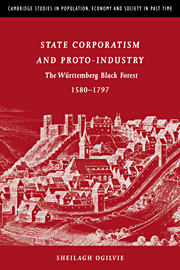Book contents
- Frontmatter
- Contents
- List of figures
- List of tables
- Acknowledgements
- List of abbreviations
- Weights, measures and coinage
- Glossary
- Maps
- 1 Introduction
- 2 The proto-industrialization debate
- 3 Social institutions in early modern Württemberg
- 4 The Black Forest worsted indust
- 5 The finances of the proto-industrial guil
- 6 Labour supply and entry restrictions
- 7 Production volume and output controls
- 8 Population growth and the family
- 9 Corporate groups and economic development
- 10 Corporatism and conflict
- 11 Proto-industry and social institutions in Europe
- 12 Conclusion
- Bibliography
- Index
- Cambridge Studies in Population, Economy and Society in Past Time
3 - Social institutions in early modern Württemberg
Published online by Cambridge University Press: 29 October 2009
- Frontmatter
- Contents
- List of figures
- List of tables
- Acknowledgements
- List of abbreviations
- Weights, measures and coinage
- Glossary
- Maps
- 1 Introduction
- 2 The proto-industrialization debate
- 3 Social institutions in early modern Württemberg
- 4 The Black Forest worsted indust
- 5 The finances of the proto-industrial guil
- 6 Labour supply and entry restrictions
- 7 Production volume and output controls
- 8 Population growth and the family
- 9 Corporate groups and economic development
- 10 Corporatism and conflict
- 11 Proto-industry and social institutions in Europe
- 12 Conclusion
- Bibliography
- Index
- Cambridge Studies in Population, Economy and Society in Past Time
Summary
The theories of proto-industrialization paint a clear picture of the social framework within which proto-industries are supposed to have developed in early modern Europe. Before proto-industrialization, they claim, Europe was a ‘peasant’ society in the sense used by Alexander Chayanov. ‘Traditional Europe’, according to Franklin Mendels, was a society in which peasant agriculture ‘had priority over all other activities’. Agriculture was a ‘backward, non-capitalistic sector’ wage rates were ‘set by “custom”’, and consequently there was ‘surplus’ labour. The rural population ‘remained isolated from market forces’. According to Kriedte, Medick and Schlumbohm, too, European society before proto-industrialization was a Chayanovian ‘peasant economy’. In rural areas, production, consumption and reproduction were strictly controlled by the strong peasant family. These families in turn were rooted in self-subsistent, ‘autonomous’ and highly regulated communities. Taxation and regulation by landlords and princes were the only outside contacts. Markets were largely irrelevant: ‘Only a small part of the total output of the peasant economy entered the market.’ Urban society was similar: life was strictly regulated by strong partriarchal families of craftsmen and merchants, and economic and demographic behaviour were ‘tightly controlled’ by ‘guild relations of production’, which ‘imposed limits on the expansion of industrial commodity production by merchant and putting-out capital’.
Proto-industry, the theorists argue, changed all this. In contrast to farming, proto-industries were ‘market-oriented’ and created ‘market connections’, according to Mendels.
- Type
- Chapter
- Information
- State Corporatism and Proto-IndustryThe Württemberg Black Forest, 1580–1797, pp. 35 - 85Publisher: Cambridge University PressPrint publication year: 1997

